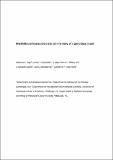Methyltransferases mediate cell memory of a genotoxic insult
Author(s)
Engelward, Bevin P.; Rugo, Rebecca; Mutamba, James Tendai; Yee, Tiffany L.; Chaillet, J. R.; Greenberger, Joel S.; Mohan, K. N.; ... Show more Show less
DownloadEngelward_oncogene_with figs_v21.pdf (675.1Kb)
OPEN_ACCESS_POLICY
Open Access Policy
Creative Commons Attribution-Noncommercial-Share Alike
Terms of use
Metadata
Show full item recordAbstract
Characterization of the direct effects of DNA-damaging agents shows how DNA lesions lead to specific mutations. Yet, serum from Hiroshima survivors, Chernobyl liquidators and radiotherapy patients can induce a clastogenic effect on naive cells, showing indirect induction of genomic instability that persists years after exposure. Such indirect effects are not restricted to ionizing radiation, as chemical genotoxins also induce heritable and transmissible genomic instability phenotypes. Although such indirect induction of genomic instability is well described, the underlying mechanism has remained enigmatic. Here, we show that mouse embryonic stem cells exposed to γ-radiation bear the effects of the insult for weeks. Specifically, conditioned media from the progeny of exposed cells can induce DNA damage and homologous recombination in naive cells. Notably, cells exposed to conditioned media also elicit a genome-destabilizing effect on their neighbouring cells, thus demonstrating transmission of genomic instability. Moreover, we show that the underlying basis for the memory of an insult is completely dependent on two of the major DNA cytosine methyltransferases, Dnmt1 and Dnmt3a. Targeted disruption of these genes in exposed cells completely eliminates transmission of genomic instability. Furthermore, transient inactivation of Dnmt1, using a tet-suppressible allele, clears the memory of the insult, thus protecting neighbouring cells from indirect induction of genomic instability. We have thus demonstrated that a single exposure can lead to long-term, genome-destabilizing effects that spread from cell to cell, and we provide a specific molecular mechanism for these persistent bystander effects. Collectively, our results impact the current understanding of risks from toxin exposures and suggest modes of intervention for suppressing genomic instability in people exposed to carcinogenic genotoxins.
Date issued
2010-11Department
Massachusetts Institute of Technology. Department of Biological EngineeringJournal
Oncogene
Publisher
Nature Publishing Group
Citation
Rugo, R. E. et al. “Methyltransferases mediate cell memory of a genotoxic insult.” Oncogene (2010): p.1–6
Version: Author's final manuscript
ISSN
0950-9232
1476-5594